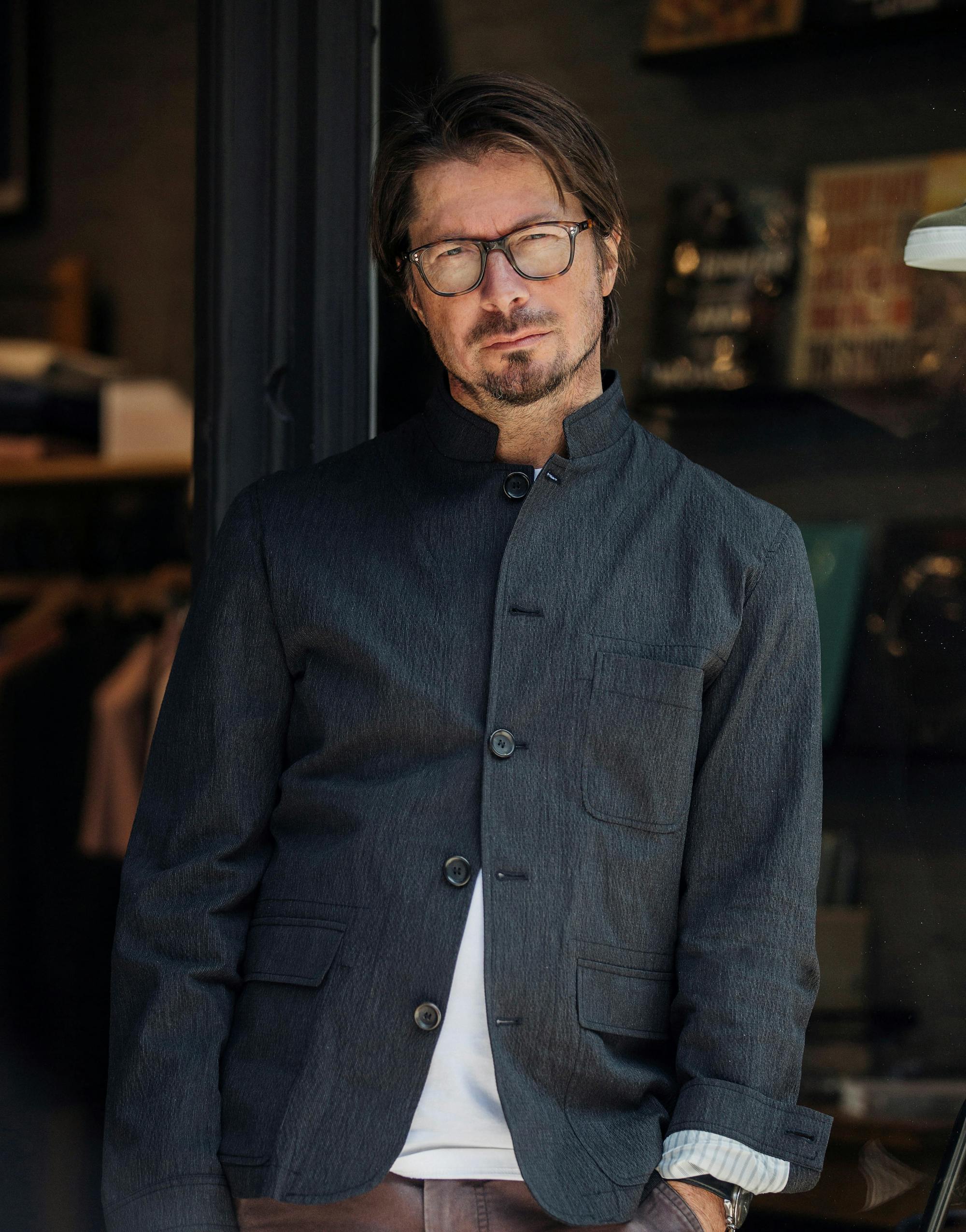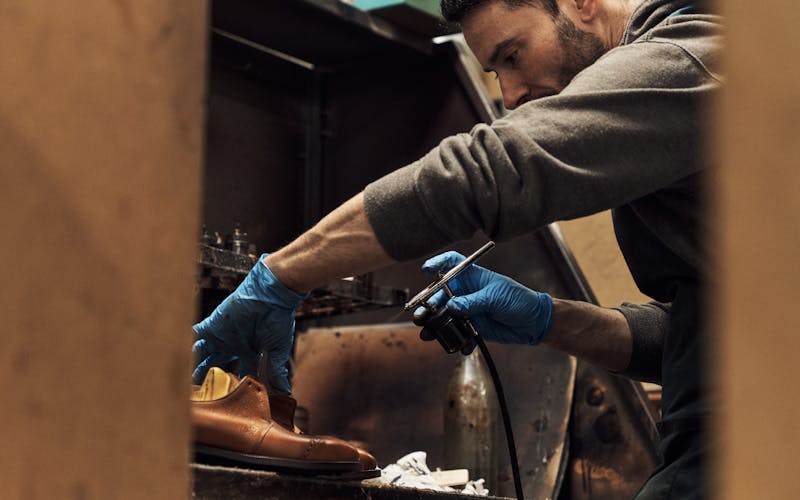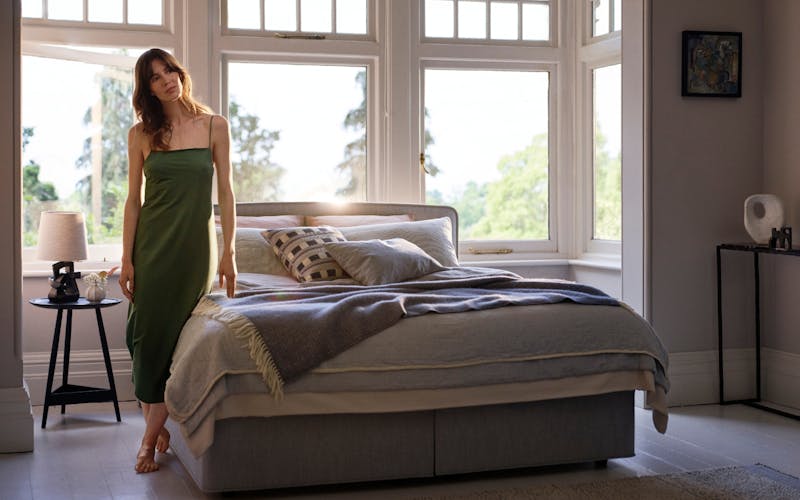

for Walpole members and
non-members available now
at The Londoner



On Saturday, I decided to do a constitutional bicycle ride into town. There is something beautiful about a sunny decongested London, even though it feels quite eerie. I found myself on Holborn Viaduct, one of my favourite structures in the city, which always seems to take me by surprise. A short bridge opened by Queen Victoria in 1869, it was built to connect Holborn to Newgate Street, spanning the Fleet Valley, and acts as a flyover, one of London’s first, with Farringdon Road running beneath, and the subterranean River Fleet running below the tarmac.
I don’t know how many times I must have crossed the viaduct, usually in a hurry to reach the West End from Shoreditch, which is where my office is. But on Saturday I stopped to take in the view and noticed for the first time, four bronze statues that stand on the bridge. They are of women and, as their plinths declare, are allegorical representations of Agriculture, Science, Fine Art and Commerce. In the warmth of a lockdown Saturday, these struck me as being peculiarly apposite: at the moment we certainly need agriculture to feed our bodies, but we also need fine art to feed our souls; and we need science to save us; and commerce is really hurting.
I realised later that while in the case of my bike ride I was literally seeing the city in a new way, metaphorically speaking I have been looking at things differently recently. And this seems to be a common experience among many of those I speak to at the moment. Indeed it would be strange if we were not, considering the seismic shift that has affected our lives.
One person who is definitely preoccupied by the idea of looking at things in a new light is British fashion designer Oliver Spencer. A lifelong sailor, when lockdown was declared, Spencer was in the Isle of Wight at his place there. He hasn’t come back to London. In fact, he’s started what sounds like some sort of Sixties off-the-grid community with his family and a couple of friends who were also down with him at the time. ‘One of them has had his whole Bloomberg terminals packed up and shipped down here and he sits upstairs in the attic trading all day,’ explains Spencer.
He hates to say it, and he’s embarrassed and feeling a bit guilty about this, but he’s having quite a nice time. ‘It’s been six weeks; I’ve got a garden to run around in, we’re pretty self-sufficient down here,’ he explains. And on cue, one of his three boys comes to pester him to play cricket.
It sounds pretty idyllic. Apart from the fact that he’s also had to close all his shops and, he explains, has about one million pounds of undelivered summer stock in warehouses that makes up the inventory of his own mothballed stores and cancelled wholesale orders for the season.
‘When this first happened, I simply couldn’t think about it,’ he says. ‘The first two weeks, I just went to work in my garden; I needed time to think.’
Oliver Spencer has two British fashion businesses. The eponymous Oliver Spencer label makes the kind of discretely stylish menswear that is much loved by those who don’t like to look like they are trying too hard. The other is Favourbrook, the label he started in the early Nineties on a stall in the Portobello Road making waistcoats out of seconds of British ecclesiastical cloth (from Stephen Walters’ silk mill).
Now he’s swapped his pitch in west London for an elegant Lutyens-designed building in Pall Mall and has built up a loyal clientele of men and women looking for clothes for the summer season, winter parties and special occasions. Favourbrook is the official licensee for Royal Ascot this year.
‘I really don’t know what will happen to Favourbrook,’ he confides. ‘There aren’t any weddings and Ascot’s been cancelled. I think it’s going to be a long road back for that business. But we have a plan and we’ll make it work. When people are allowed out again, they’ll want to see each other, and they’ll want to dress up again.’
I tell him that given the circumstances he sounds remarkably chipper. That’s because those two weeks in the garden have paid off, he explains. He’s been thinking. And he’s come to some interesting conclusions.
‘Things have to change,’ he says. ‘In fact, they had to change before but now we are being forced into it.’
Spencer explains that the schedules governing the fashion business need to be reset, and he has been spending his time over the past few weeks contacting everyone he knows in the business in the UK to try to get them on board with his conviction. ‘Because of the situation, the selling season has changed. Normally we’d be putting autumn/winter clothes into store end of July, beginning of August, but now production has moved. There’ll no longer be a July delivery, it will be September. And If you deliver in September you can’t reduce prices and go on sale before Christmas because you haven’t had enough time at full price on the shop floor.’ So, he says, we’re actually going to have to go back to where we were years ago, delivering clothes to match the seasons we live in.
This is what he’s trying to get other luxury designers and firms to come to an agreement on. To unilaterally shift away from early deliveries and discounting. ‘Things like Black Friday and Crazy Wednesday are the most stupid things for a business like mine to get involved with.’
The problem, says Spencer, is that we have been led by America, a country that from a fashion design point of view, he considers to be in deep, deep trouble. ‘Bergdorf and Nieman are in trouble, and if you think about it they’ve [the Americans] no decent working designers at the moment. And they’ve spent the last five years following this discount model.’
His answer: ‘Deliver in September. Don’t go on sale until 1 January; let’s realign the season. Spring/summer – I don’t want to deliver until late February, that’s where it’s at. Therefore we’ve realigned everything, and this is the way it should stay. We’re just going back about 10 years to what we used to do.’
His words make me think of my recent conversation with Giorgio Armani, documented in my column for Walpole published on 6th April. Here, the Italian designer said: ‘I have long believed that there is a need to slow down, to show less product and to return to considering the requests and needs of customers. I therefore hope we might arrive at a system that is truer in human terms.’ It is Armani’s belief that the fashion “system” as he calls it, driven by the methodology of fast-fashion, is out of step with customers’ needs. In other words, a system that has created a calendar that has little to do with how we live our lives.
This is, of course, self-evident. Talk to anyone who doesn’t work in fashion and ask them when winter clothes should be in shops. The answer will not be July. It is almost paradoxical that fashion talks of seasons, when its seasons have little to do with what Keats or Vivaldi would understand by the term – the eternal cycle of nature where the weather determines our need (and desire for) warm weather clothes or their winter alternative. Add to this the evolution of pre-season collections, capsule collections, outlet collections etc and the sense you get is of a vast machine, forcing designers to tick boxes, along with the shows, promotions and discounting that this volume of activity will lead to.
For Oliver Spencer, this all has an added dimension that is very worrying. One of his aims – maybe the most pressing of all – is to make his business and his product as sustainable as possible.
And as he puts it – ‘To make less, but to make better.’ I remember a couple of years ago being invited to a preview of whatever new collection Spencer was presenting at the time, and finding a man who seemed to have had an epiphany. He told me that sustainability was the most important thing on his future agenda – because it was the right thing to do and important to him, and, moreover, because it was increasingly important to his customers. Especially the younger ones. I must confess the cynic in me wondered whether this was some sort of fleeting passion, born of what was in the air at the time. But since then, Spencer has been as good as his word, and underlying his business is a healthy commitment to using organic materials, eco-friendly packaging, renewable energy and providing recycling facilities.
‘I am simply not looking at growth through discount as a model,’ he says. ‘Any factory that is pushing me in that way – to volume because of price – or mills, I am simply not working with them anymore. We need to go close in on our footprint and how we produce right now. I have been pursuing this for four years now. Our eco-credentials are a journey, but they’re becoming better by the minute.’
Unsurprisingly, this issue has a bearing on what he has decided to do with all that spring/summer 2020 stock in his warehouses that won’t see the light of day anytime soon. ‘We had one million pounds of Oliver Spencer product cancelled within the first week of lockdown. So I’ve decided that I will simply present it next year as my spring/summer 2021 collection. It is not sustainable to design another collection – financially or in terms of our eco-footprint. So I am holidaying stock.’
Again, this points to another aspect of the fashion system. The notion that newness is essential. Spencer’s point is that what he has designed for 2020 will not be significantly less fashionable in 2021 – and not just because no one will have seen it in a physical store before. The principles of good design, he explains, have an eternal appeal, which is something, again, that the industry has lost sight of.
As an aside, this chimes with another conversation I had recently with Alan Scott, design director of Scottish cashmere specialists Johnstons of Elgin. Scott was explaining how, like Oliver Spencer, winter deliveries will be late this year – in the case of Johnstons of Elgin, not until October. But he was excited about this. ‘Johnstons was founded in 1797 and we still make cashmere in the same mill; and we make beautiful pieces. In fact, we make for many of the world’s most famous fashion brands as well as creating our own designs, because we have a level of craftsmanship that is unique in the world.’
Scott talks about how he realised that this longevity provides a real clue as to what people really and consistently want from them. So he has just revisited all the firm’s classic knits in terms of proportions for this winter; his focus has been to look at the perennial pieces: ‘I really think consumer buying habits may change now – people may reassess their wardrobe staples and choose to invest in good quality basics that they can wear year after year. That’s why I’m focusing on our classic cashmere pieces, made in the UK and designed to last.’
Johnstons of Elgin owns its own factory, up in the Highlands, so it can control its output. Spencer acknowledges that his plan of “holidaying” his stock may not cause his business a huge problem seeing as he has mothballed his stores at the moment – and is seeing strong online sales – but it will have consequences for the factories he works with. ‘I do understand it is a big deal for them. We’ve already paid all our manufacturers for the goods. The problem they will have is that they will have so much less work next year.’
What Spencer has done though, is taken the current situation and used it as an opportunity to think about things he would like to have changed about his business in any case. And for me this is a huge issue where the narrative of returning to normal is concerned. Because, quite clearly, what I am finding from many people in the luxury sector is that they think there were things about “normal” that were not great.
On a wider level, one of the dangers we are facing is that if people simply want to go back to exactly where we were pre-COVID-19, there is a danger that we will have missed an opportunity to fix some things that needed fixing.
Does Spencer think that people are rethinking in the way he is?
‘I hope so, and it’s not just down to us, the makers; it’s also about how consumers respond,’ he says. For example, he doesn’t think that “the thrill of retail” as he puts it will be diminished. ‘Actually, I think there’s more of a thrill to the idea of retail in a physical store right now than ever. But I think people will have a good long and hard think about fashion businesses that just piling it high and selling it cheap. I really hope that sort of high-street approach will be over. And the consumer that wants to carry on taking part in it has got to take a really good look at themselves.’ He admits, the concept of less is more is much easier for men to buy into, who, he says, as a demographic are traditionally slower to react to trends. ‘It’s more of a challenge in womenswear. Getting the green message to young women will be harder – they are really open to throwaway fashion.’
It’s like bucket holidays and cheap air travel, he says. They will have to change. ‘Of course people want to go on holiday,’ he says, ‘but maybe they will think about getting on a plane for no good reason. Anyway the rest of this year we should be holidaying in Britain, as we need to get the economy started.’
No doubt he’ll be recommending the Isle of Wight.
Pictured above: Oliver Spencer with The Turbans.





